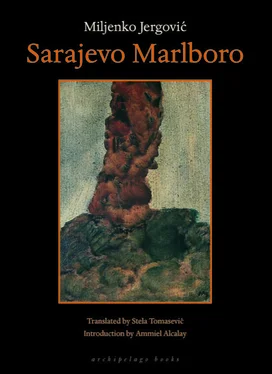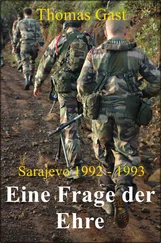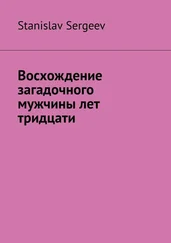In the hospital Salih F. was treated like a king. He was given his own room with a television, a tape recorder and a comfortable armchair. The doctors were thrilled to have such an opportunity to study a human guinea pig who had witnessed his next of kin being cut to pieces — legs first, then the arms, and finally the heads. At regular intervals the men in white coats used to check on Salih F. by peering through the spyhole. Most of the time he sat quietly in the armchair, watching television, changing channels and munching grapes lazily. He looked no different from everybody else in the world who follows the latest news from Bosnia with a lack of interest.
The doctors concluded that Salih F. was actually in a state of shock. They drafted long and pedantic reports about him, wrote papers for psychiatric journals, discussed various prognostications and waited patiently for Salih F.’s battered and bloody soul to recover. But over the next few months his condition did not change. Salih F. lived from day to day without fuss, always replying politely to the doctors’ questions but making no special requests and apparently displaying no interest in the hospital’s plans for his future. The doctors attempted to bring Salih F. out of shock by providing him with a hobby. They offered him singing lessons, drawing paper or a course in photography. Just choose which you’d prefer, they said, and he thanked the men in white coats, adding that he didn’t need or like any of those activities. But the doctors insisted — and so in the end Salih F. agreed to take up drawing. He couldn’t sing and was scared of photographs.
Salih F. used to draw obediently whenever it was time for his drawing practice, but at the end of a session he would go back to watching television and munching grapes. Predictably the doctors sat up late at night analyzing his drawings. He used a brown wooden pencil to draw a hut, a green one for the grass and a yellow one for the sun. He drew eyes and a mouth on the sun; it was a copy, he said, of a picture he had seen as a child. Sometimes he had to explain to the doctors the nature of a particular drawing. The men in white coats used to smile as they listened to his explanations. But sometimes they asked follow-up questions that were too confusing for the interpreter to translate.
The day finally came when a decision had to be made about the future of Salih F. The doctors had prepared only one question. “What would you do,” they said, “if you caught the murderers of your wife and daughters?” Salih F. replied that such a thing was unlikely to happen. By now the Chetniks responsible were far away, across many borders and barbed-wire fences and lines of battle. But the doctors insisted, assuring him that many things were possible even if they seemed unlikely at first. And so, recognizing that his questioners were like small children, and that it was necessary for them only to imagine a situation in order to make it a reality, Salih F. replied, “I would kill them,” adding, “or I would give them a pen and paper and tell them, as you tell me, to DRAW!”
The doctors’ faces lit up. They took their pens and papers and pronounced Salih F. insane.
Down there the devils multiply. .
Djordje Balašević
The Colony was built by the Austro-Hungarians a few years after they came to Bosnia. The bungalows were laid out in two rows with military precision. In the tiny gardens only wild marigolds grew — and the odd lettuce perhaps. In front of every house there was a little wooden table and two or three stools. In the summer evenings the smell of coffee and rakija wafted everywhere; both drinks were served in Turkish cups with a gold star and crescent moon in the bottom. Even the shrieks of playing children couldn’t disturb the peace. For almost a hundred years the miners and their children, grandchildren and great-grandchildren have lived here, descendants of those who had left other parts of the empire and turned up one morning with their cardboard suitcases at the Kakanj railway station. They set up home in the Colony and lived lives without hopes and expectations, perhaps, but with a kind of inner peace that sometimes creates the illusion of happiness. And the pattern of life was upset only on those black days — which did occur, however, with demonic regularity, about every four years or so — when the siren blasted the news that some of the miners had not returned from the pits alive.
On the other side of town was a Catholic church — and nearby a mosque. As if by some tradition, the Orthodox people didn’t live in the Colony, nor did they go down the mines. Communism barely affected the lives of the miners. The pits were too dark to foster any rethinking of ideological views. Decades passed, and the organized diplomatic tours avoided the Colony. The inhabitants weren’t affected by the passage of time or by other worldly fashions. And so they continued to be ignorant of such things as traffic pollution, neon lights and synthesized muzak. Only the thick layers of dust, which turned into mud during the autumn, and the increasingly dirty façades suggested that life was about to change — or perhaps it was just returning full circle: the young folk looked back to a period when their grandfathers roamed up and down Bosnia looking for mines, but they also looked forward to the day in the not too distant future when the pits and the Colony would cease to exist.
As soon as war broke out, nobody went down the mines any more. People carrying weapons and flags marched through Kakanj. Some of the inhabitants left, never to return. Others wasted a lot of time in bars, cursing too loudly. In other words, fear entered the Colony — mostly fear of other people, of strangers, of spies, of messengers bringing bad news, but also fear of the night. At daybreak somebody would start shooting, and of course there would be a response from the hills. With the dawn chorus many frightened and tired faces would look out of the houses. Now, every night was like those nights in the past when the siren broke the news of a mining accident.
On such a morning Rudo L. packed his things in a case, locked the front door and the gate, left the keys with his neighbor and, without much explanation, set off toward Vareš on foot. When he reached the church he crossed himself and swore that he would never tell anybody what had happened that night, in his thoughts or his dreams, to induce him to leave Kakanj. Vows seldom have any rational basis. Often they are just ridiculous and pointless, but they can seriously burden a person. Sometimes a vow ends up costing a life. But as the folk in this part of the country are obstinate by nature and thus, in an odd way, rather devout, they seldom break their vows. All around Bosnia people cautiously tell one another stories about horrors that befall those who break their promises. The commitment of a Bosnian who has made a vow can be glimpsed in his face or read in his eyes. It often makes you want to question him or to put temptation in his way or to subject him to other kinds of torture. His persistence makes him appear unstable in other people’s eyes.
When the people in Vareš asked Rudo L. what had occurred that night to make him leave, he refused to say, and so everybody concluded that it must have been something terrible. But as the imagination is always provoked by secrecy, the questioning just intensified; it became more probing and more organized, until it was taken up by those in authority. The police questioned Rudo L. for days, but he stubbornly remained silent. He didn’t even attempt to lie, but nevertheless objected repeatedly to the idea that he was suffering from amnesia as a result of the horrors he had witnessed. Rudo L. no longer knew which was worse: being pressured to break a vow or perhaps being certified insane. In any case, he regretted ever having left Kakanj. Yet it was too late to return. He didn’t worry that he would probably be killed if he ever went back. He was more disturbed by the idea that, in a manner of speaking, his return would be tantamount to breaking his vow. Such a move would only revive the horrors that played on his mind the morning he left the Colony.
Читать дальше










